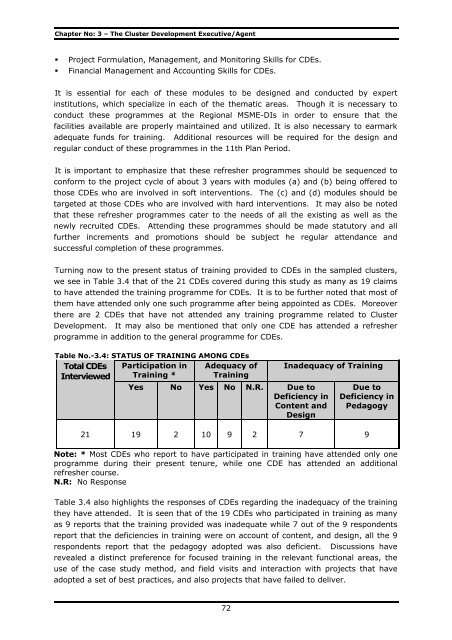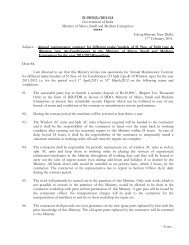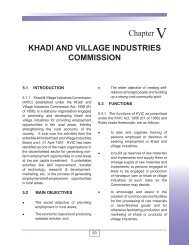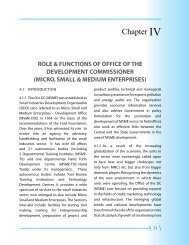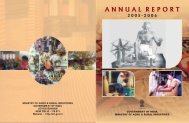Evaluation Study MSE Cluster Development - Ministry of Micro ...
Evaluation Study MSE Cluster Development - Ministry of Micro ...
Evaluation Study MSE Cluster Development - Ministry of Micro ...
Create successful ePaper yourself
Turn your PDF publications into a flip-book with our unique Google optimized e-Paper software.
Chapter No: 3 – The <strong>Cluster</strong> <strong>Development</strong> Executive/Agent• Project Formulation, Management, and Monitoring Skills for CDEs.• Financial Management and Accounting Skills for CDEs.It is essential for each <strong>of</strong> these modules to be designed and conducted by expertinstitutions, which specialize in each <strong>of</strong> the thematic areas. Though it is necessary toconduct these programmes at the Regional MSME-DIs in order to ensure that thefacilities available are properly maintained and utilized. It is also necessary to earmarkadequate funds for training. Additional resources will be required for the design andregular conduct <strong>of</strong> these programmes in the 11th Plan Period.It is important to emphasize that these refresher programmes should be sequenced toconform to the project cycle <strong>of</strong> about 3 years with modules (a) and (b) being <strong>of</strong>fered tothose CDEs who are involved in s<strong>of</strong>t interventions. The (c) and (d) modules should betargeted at those CDEs who are involved with hard interventions. It may also be notedthat these refresher programmes cater to the needs <strong>of</strong> all the existing as well as thenewly recruited CDEs. Attending these programmes should be made statutory and allfurther increments and promotions should be subject he regular attendance andsuccessful completion <strong>of</strong> these programmes.Turning now to the present status <strong>of</strong> training provided to CDEs in the sampled clusters,we see in Table 3.4 that <strong>of</strong> the 21 CDEs covered during this study as many as 19 claimsto have attended the training programme for CDEs. It is to be further noted that most <strong>of</strong>them have attended only one such programme after being appointed as CDEs. Moreoverthere are 2 CDEs that have not attended any training programme related to <strong>Cluster</strong><strong>Development</strong>. It may also be mentioned that only one CDE has attended a refresherprogramme in addition to the general programme for CDEs.Table No.-3.4: STATUS OF TRAINING AMONG CDEsTotal CDEsInterviewedParticipation inTraining *Adequacy <strong>of</strong>TrainingYes No Yes No N.R. Due toDeficiency inContent andDesignInadequacy <strong>of</strong> TrainingDue toDeficiency inPedagogy21 19 2 10 9 2 7 9Note: * Most CDEs who report to have participated in training have attended only oneprogramme during their present tenure, while one CDE has attended an additionalrefresher course.N.R: No ResponseTable 3.4 also highlights the responses <strong>of</strong> CDEs regarding the inadequacy <strong>of</strong> the trainingthey have attended. It is seen that <strong>of</strong> the 19 CDEs who participated in training as manyas 9 reports that the training provided was inadequate while 7 out <strong>of</strong> the 9 respondentsreport that the deficiencies in training were on account <strong>of</strong> content, and design, all the 9respondents report that the pedagogy adopted was also deficient. Discussions haverevealed a distinct preference for focused training in the relevant functional areas, theuse <strong>of</strong> the case study method, and field visits and interaction with projects that haveadopted a set <strong>of</strong> best practices, and also projects that have failed to deliver.72


